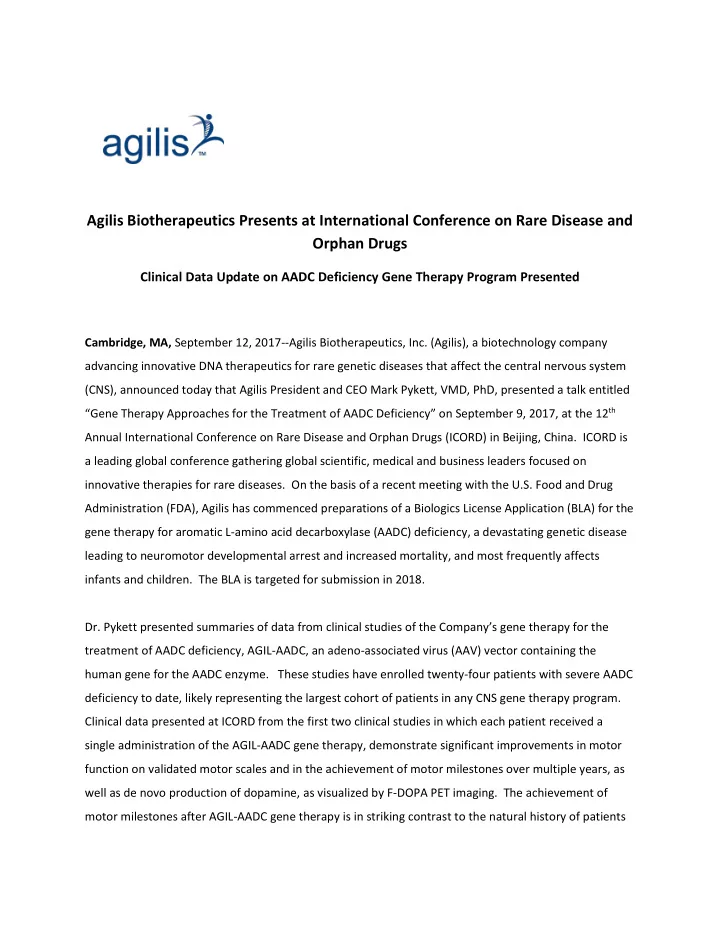

Agilis Biotherapeutics Presents at International Conference on Rare Disease and Orphan Drugs Clinical Data Update on AADC Deficiency Gene Therapy Program Presented Cambridge, MA, September 12, 2017--Agilis Biotherapeutics, Inc. (Agilis), a biotechnology company advancing innovative DNA therapeutics for rare genetic diseases that affect the central nervous system (CNS), announced today that Agilis President and CEO Mark Pykett, VMD, PhD, presented a talk entitled “Gene Therapy Approaches for the Treatment of AADC Deficiency ” on September 9, 2017, at the 12 th Annual International Conference on Rare Disease and Orphan Drugs (ICORD) in Beijing, China. ICORD is a leading global conference gathering global scientific, medical and business leaders focused on innovative therapies for rare diseases. On the basis of a recent meeting with the U.S. Food and Drug Administration (FDA), Agilis has commenced preparations of a Biologics License Application (BLA) for the gene therapy for aromatic L-amino acid decarboxylase (AADC) deficiency, a devastating genetic disease leading to neuromotor developmental arrest and increased mortality, and most frequently affects infants and children. The BLA is targeted for submission in 2018. Dr. Pykett presented summaries of data from clinical studies of the Company’s gene th erapy for the treatment of AADC deficiency, AGIL-AADC, an adeno-associated virus (AAV) vector containing the human gene for the AADC enzyme. These studies have enrolled twenty-four patients with severe AADC deficiency to date, likely representing the largest cohort of patients in any CNS gene therapy program. Clinical data presented at ICORD from the first two clinical studies in which each patient received a single administration of the AGIL-AADC gene therapy, demonstrate significant improvements in motor function on validated motor scales and in the achievement of motor milestones over multiple years, as well as de novo production of dopamine, as visualized by F-DOPA PET imaging. The achievement of motor milestones after AGIL-AADC gene therapy is in striking contrast to the natural history of patients
with severe AADC deficiency as they fail to achieve milestones and have no functional movement. Data on the first study demonstrate that the significant improvements in motor function are sustained over a 5-year period post-treatment, indicating a robust and persistent response to the gene therapy. Data on the second study have recapitulated the functional improvements observed in the first study, demonstrating the reproducibility of the treatment response. The Company has recently completed enrollment of a Phase IIb clinical study for AGIL-AADC, which may be extended to permit the treatment of additional patients in need of therapeutic intervention. There are currently no approved treatment options for patients. AADC deficiency is a rare CNS disorder arising from a reduction in the enzyme aromatic L-amino acid decarboxylase that result from mutations in the dopa decarboxylase (DDC) gene. This reduction leads to deficits in the neurotransmitters dopamine, norepinephrine, epinephrine, serotonin and melatonin. In its profound forms, AADC deficiency causes arrested development such that patients fail to gain motor milestones or functional movement. Patients also have marked floppiness, episodic abnormal movements including oculogyric crises, autonomic impairment, as well as difficulty with swallowing and feeding problems resulting in growth impairment. Patients with severe AADC are completely dependent on others for all daily functioning and have frequent hospitalizations related to complications from their severe neurologic impairment that ultimately culminates in premature death. Due to the presence of certain founder mutations, AADC deficiency may have elevated incidence/prevalence levels in certain countries in Asia, potentially having significant numbers of patients and representing market opportunities for the Company’s gene therapy upon approval in those countries. “ We are pleased to participate in the ICORD Annual Conference and present recent progress on AGIL- AADC and the preparation of registration activities for its approval in multiple countries, ” said Mark Pykett. “ As we seek approval for the gene therapy product to make it available for patients in need, it is important to raise awareness of this devastating rare disease among the scientific and medical community around the world. The ICORD Conference is a tremendous opportunity to spread the word about the disease and about the potential for an innovative new treatment option with gene therapy. ”
About AADC Deficiency Aromatic L-amino acid decarboxylase (AADC) deficiency is a rare genetic condition resulting in lack of functioning AADC enzyme responsible for the final step in the synthesis of key neurotransmitters dopamine (a precursor of norepinephrine and epinephrine) and serotonin (a precursor of melatonin). AADC deficiency results in developmental failure, global muscular hypotonia, severe, seizure-like episodes known as oculogyric crises, autonomic abnormalities, and the need for life-long care. Given this neurologically devastating illness, patients with severe AADC deficiency have a high risk for death during childhood. Treatment options for patients with AADC deficiency are limited and there are currently no approved therapies. About Agilis Biotherapeutics, Inc. Agilis is advancing innovative gene therapies designed to provide long-term efficacy for patients with debilitating, often fatal, rare genetic d iseases that affect the central nervous system. Agilis’ gene therapies are engineered to impart sustainable clinical benefits by inducing persistent expression of a therapeutic gene through precise targeting and restoration of lost gene function to achieve long-term efficacy. Agilis’ rare disease programs are focused on gene therapy for AADC deficiency, Friedreich’s ataxia, and Angelman syndrome, all rare genetic diseases that include neurological deficits and result in physically debilitating conditions. We invite you to visit our website at www.agilisbio.com For more information, contact Agilis Biotherapeutics, Inc. Dr. Jodi Cook Chief Operating Officer Email: jcook@agilisbio.com
Recommend
More recommend